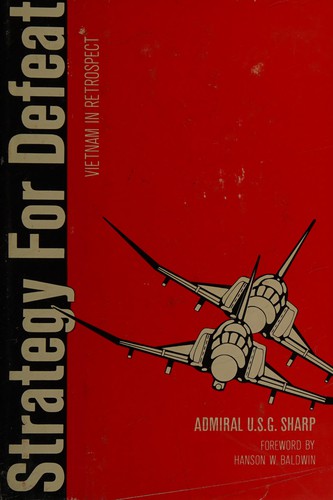CINCPAC talks failures in Vietnam
4 stars
An easy read, only 271 pages of actual narrative. I recommend it to folks interested in Vietnam war history, and history of air power in war in general.
Always interesting to hear "from the horse's mouth" so to speak. Admiral Ulysses Simpson Grant Sharp Jr. (grand-nephew of his namesake the President and Civil War General) brings forward a first person tale about how the civilian and military leadership of the US fought the war in Vietnam. He was the Commander in Chief of all US forces in the Pacific and served from 64-68 in that role.
Most history I've encountered of this period focuses on the life of the fighting men (mostly men then) and less on the strategic context. The Admiral puts you in the chain of command between Secretary McNamara and the combat forces in theater and discusses his view as the conflict progressed. The crux …
An easy read, only 271 pages of actual narrative. I recommend it to folks interested in Vietnam war history, and history of air power in war in general.
Always interesting to hear "from the horse's mouth" so to speak. Admiral Ulysses Simpson Grant Sharp Jr. (grand-nephew of his namesake the President and Civil War General) brings forward a first person tale about how the civilian and military leadership of the US fought the war in Vietnam. He was the Commander in Chief of all US forces in the Pacific and served from 64-68 in that role.
Most history I've encountered of this period focuses on the life of the fighting men (mostly men then) and less on the strategic context. The Admiral puts you in the chain of command between Secretary McNamara and the combat forces in theater and discusses his view as the conflict progressed. The crux of his message is that the US political leadership did not process well the lessons of the armistice negotiations with North Korea. He plays that out by discussing the ineffective use of American air power throughout the conflict including the self imposed limitation on use on strategic warmaking targets.
This book, written in 1979, was clearly read by a later generation of American military minds as many of the lessons observed here appear, to me, to have been learned very well. Not that there weren't other hard lessons yet to be observed...

